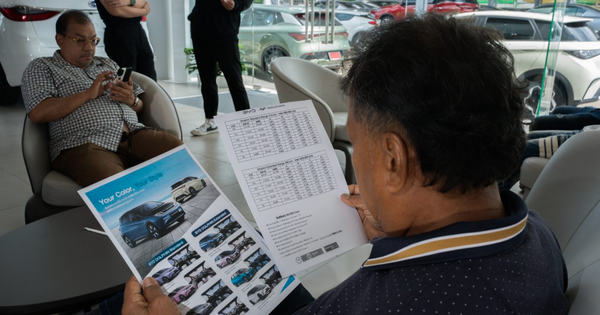The Plight of Electric Vehicle Owners in China: Depreciation Woes and Financial Crisis
The electric vehicle market in China, the world’s largest, is facing a downturn as consumers reduce spending following the pandemic. To maintain sales, manufacturers have resorted to lowering prices, leaving many owners feeling frustrated as their newly purchased vehicles depreciate in value. This phenomenon has also contributed to the financial crisis faced by some electric vehicle companies, limiting access to after-sales services for thousands of customers.
The Harsh Reality of Depreciation
Mandy Pan, an electric vehicle owner in China, experienced the unpleasant surprise of her vehicle’s sudden price drop. When she bought a silver plug-in hybrid vehicle from leading Chinese electric vehicle manufacturer BYD, she thought she had made a wise investment. The Qin Plus model was affordable and had low energy consumption, justifying Pan’s decision to make a substantial down payment to finance her 94,800 Chinese yuan (USD 13,168) asset.
However, less than four months later, amidst the intense price competition in the Chinese electric vehicle market, the Qin Plus model saw a sudden price reduction of 15,000 Chinese yuan. Pan felt deceived, stating, “I feel like I lost 15,000 Chinese yuan. At the very least, they should compensate us a little. I truly regret buying this car.”
The Electric Vehicle Market’s Challenges
After years of rapid growth due to government support, the Chinese electric vehicle market is now facing a period of consolidation. The declining consumer spending has led manufacturers to reduce prices to maintain sales volume. However, this has resulted in discontent among some vehicle owners, who find their recently purchased cars losing value within weeks. Additionally, the financial crisis faced by certain electric vehicle companies has left thousands of customers unable to access after-sales services and maintenance.
Startups such as HiPhi, WM Motor (backed by Baidu), and Aiways (backed by Tencent) have depleted their funds to sustain operations. Other brands, including Levdeo and Singulato Motors, have resorted to bankruptcy proceedings.
Experts predict that the Chinese electric vehicle industry is transitioning from uncontrolled growth to consolidation. Annual sales of new energy vehicles, including electric and plug-in hybrid cars, are projected to increase by 22% by 2024, a slower growth rate compared to previous years.
Competitive Price Reductions
To adapt to market conditions, automobile manufacturers have actively reduced prices. For instance, BYD, the best-selling brand in China with an estimated sales volume of around 2.4 million units by 2023, has also reduced prices for most of its vehicle models since February. A plug-in hybrid version, priced at 79,800 Chinese yuan (USD 11,112), has been introduced with the slogan “Cheaper Battery, More Powerful.”
“The general sentiment about China’s economy is not good. There are still too many brands and too many products,” said Tú Lê, founder of Sino Auto Insights, in an interview with Rest of World.
The Fallout of Price Wars
The aggressive price reduction policies have left many electric vehicle owners disappointed, especially those who recently made their purchases. In February, the quality monitoring platform 12365auto.com received 6,884 complaints regarding price changes, primarily targeting domestic electric vehicle brands. On the Xiaohongshu social media platform, BYD owners have formed groups to discuss compensation claims, contacting dealerships or consumer rights protection agencies. They feel blindsided by the sudden price drop.
Ming Yang, an automobile owner from Anhui Province, expressed her frustration after purchasing a BYD Seal sedan at the end of 2022 for 240,000 Chinese yuan (USD 33,337) to take advantage of government subsidies. By February, the same vehicle model had depreciated by approximately 40,000 Chinese yuan (USD 5,556).
“People like me have worked hard for months to save up this amount of money,” Yang shared her feelings.
According to Zhang Xiang, a professor at Huanghe Science and Technology University, the price wars have gradually eliminated smaller players from China’s bustling electric vehicle industry. AlixPartners, a consulting firm, predicts that by 2030, only 25 to 30 out of more than 160 brands will have the financial stability to survive.
“In the Chinese market, most electric vehicle manufacturers are operating at a loss due to fierce competition. The high price of lithium, considered a primary factor affecting poor business performance, continues to hinder profitability even if the cost of this material does not rise,” explained an analyst from the Gong family.
One unfortunate casualty of the market challenges is HiPhi, which has struggled to increase its sales since its first car launch in 2020. Its parent company, Human Horizons, recently suspended operations. Founder Ding Lei plans to spend the next three months exploring investment options for the company’s future.
Meow Li, who purchased a HiPhi Y vehicle for 369,000 Chinese yuan (USD 51,263) in 2023, expressed deep concern. If the company goes bankrupt, she won’t be able to get her car repaired in case of an accident.
“Buying from electric vehicle startups is like making a risky investment,” said Sun Fangyuan, an influential figure in the automotive industry.
HiPhi’s financial difficulties have led its employees to sell frozen food during live direct-to-consumer broadcasts to supplement their income. In a recent livestream on the Douyin app, a sister app of TikTok, HiPhi project director Yang Yueqing even cooked steak on an electric stove powered by an HiPhi Y SUV to indirectly promote the product.
“To survive in the demanding Chinese electric vehicle market, a company must have sufficient capital, develop competitive products, and possess a strong sales team,” noted Professor David Zhang from Huanghe Polytechnic College in Zhengzhou, Henan Province.
Sources: Rest of World | SCMP

